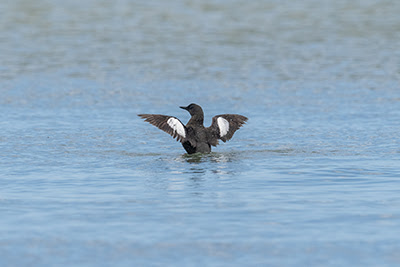So here we are in another lockdown. To be honest I'm not surprised. It was always going to happen. It doesn't matter how many lockdowns we have we can't completely eradicate the virus and it only takes a small number of people in the community to be carrying the virus for the whole cycle to start again. The year has started with a major milestone birthday for me - spent at home with a bit bit of garden ringing and a brisk walk in the frosty weather around the local lanes. We've also welcomed a new granddaughter into the World - a pretty traumatic experience for our daughter-in-law who was kept in hospital for three days after the birth so we looked after their 2 year old and dog whilst our son spent the time in the hospital with his wife and new baby. An eventful two weeks!
The frosty weather made a welcome change from the wet and wind. Good numbers of winter thrushes seem to have relocated from snowbound areas further north and east in the UK sand the local fields are full of foraging Fieldfares, Redwings and Blackbirds. Good numbers of Blackbirds have been visiting the garden and at one point I counted 13 together. I've ringed a few and have also added a new species ringed for the garden - Mistle Thrush. Although they're fairly regular visitors and there are at least two pairs in the village, I've never ringed one in the garden before. A beautiful bird and this one was aged as a 2nd calendar year bird.
As well as the Mistle Thrush I've caught and ringed a Fieldfare - again, fairly regular in winter but last year was the first time I'd ringed any in the garden. This one was aged as and adult female based on the amount of black in the crown feathers. See here for more information on sexing Fieldfares.
Its not all thrushes though and I recently caught a Collared Dove.
Again, a common enough garden bird but very wary and not easy to catch & ring.
I'm using a whoosh net for which I have an endorsement, rather than a mist net at the moment as the thrushes generally manage to get out and the collared doves invariably do. A lot of the Blackbirds have long wings and are quite heavy suggesting they may be continental birds and hopefully I'll get a ringing recovery or control to prove this.
































































No comments :
Post a Comment